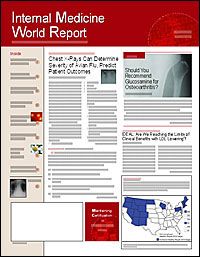Tree Bark Extract Resolves Difficult-to-Treat Venous Ulcers
Pycnogenol, a natural plant extract from the bark of the Maritime pine tree that grows along the coast of southwest France, may offer a novel solution for the treatment of ?problematic venous ulcers. It also adds to our understanding of how blood circulation can be improved, according to a new study published in Angiology (2005; 56:699-705).
The 6-week, double-blind, placebo-controlled trial included 48 patients with venous ulcers who were randomized to 1 of 3 treatments: Pycnogenol tablets, Pycnogenol tablets plus local topical wound treatment with Pycnogenol powder, and placebo tablets. All 3 groups were given a compression stocking to counteract swelling, and all had their ulcers cleaned and disinfected. Each group was regularly monitored throughout the study. Ages and male-to-female ratios were comparable in the 3 groups.
Ulcer size was reduced to 11.6% of the original size in the group treated with Pycnogenol tablets, while the ulcers healed completely in the group that also used topical Pycnogenol powder. Im?provements in the placebo group were the result of compression only, which the authors noted is "usually quite effective in these patients." No side effects were reported.
"Our goal in conducting this study was not to demonstrate the speed of Pyc?nogenol's ulcer healing, but the effect of better blood circulation in the treatment of these difficult-to-heal venous ulcers," said investigator Peter Roh?de?wald, PhD, of the Irvine2 Vascular Laboratory, Department of Biomedical Sciences, Chieti-Pescara University and San Valentino Vascular Screening Project, San Valentino, Italy. He added that "although venous ulcers occur in [only about 1%] of the population, age, obesity, and prolonged standing can contribute to poor vein health and chronic venous insufficiency, which is becoming a ?growing concern."
Venous disease currently affects about one half of all US adults and is increasing in prevalence. The more advanced condition involving varicose veins affects approximately 10% to 15% of men and 20% to 25% of women. Initial signs include visible skin discoloration; with further progression, tissue will decay and a visible open wound or ulcer will appear. Left untreated, the ulcers will not heal because of a lack of blood flow and oxygen to the wound site.
In this study, Pycnogenol also produced a measurable oxygen increase in the skin surrounding the wound, thereby enhancing blood circulation.
"For the first time, a significant improvement of the ulcer healing process in [the] lower legs was documented. We could obtain definite wound closing within 6 weeks in the patient group that orally and topically ?supp?lemented with Pycnogenol," said Dr Rohdewald.?R.M.
